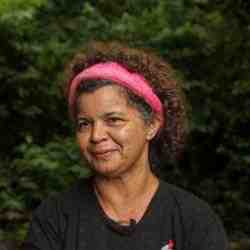Introduzione
Brazil’s quilombo population—the last vestiges of the country’s slave culture—is facing increasing hardship on a number of fronts, from land ownership to access to basic services. There is widespread recognition of their plight, yet public officials and other decision-makers suffer from a profound misunderstanding of the problems faced by these remote rural communities formed by runaway slaves. Where past efforts by outsiders have failed, Josilene (Jo) brings her own understanding of the issues as a displaced quilombola, offering fresh insight and incorporating aspects of quilombo society and culture in the development of appropriate and long-lasting social solutions.
La nuova idea
Jo is working to slow the impact of dislocation and poverty of Brazil’s quilombos. As a displaced quilombola herself, Jo approaches the problem with a unique understanding of quilombo culture and the kinds of social solutions necessary to improve their condition. She is campaigning to change perceptions of the quilombos among the public and the government, and propose innovative strategies for pulling this culture out of poverty while preserving its unique culture. While other groups, including Afro-Brazilians and landless farmers seek land redistribution through the donation of individual plots of land to individual cultivators, the quilombo’s traditional collective property ownership requires a more tailored approach to land reform. Jo is using the country’s indigenous groups, whose traditions also view land as communal property, as a legal and political reference for politicians and lawmakers to effectively tackle the issues of quilombo underdevelopment. Most importantly, her efforts aim to create conditions within quilombos so that residents are able to remain in their communities rather than migrate and continue down the unsustainable spiral of dislocation and desperation.
Jo combines her macro-level work in land reform and other public policy endeavors with a series of deeply local efforts to engage quilombolas in their own cultural and economic renaissance. She has created brinquedotecas, or play spaces, which catalyze a range of social change processes and community organizing efforts to combat a host of problems from illiteracy to a lack of health care. These brinquedotecas, which depend on the security of basic land rights, help to strengthen quilombo identity and spur the descendents of runaway slaves to raise the quality of life in their communities. Jo’s work also involves recovering a distinctive quilombola identity and channeling this cultural distinction into viable economic improvement. She bolsters pride in quilombo traditions by creating product lines based on the community’s heritage, cultural knowledge, and natural resources. In this way, quilombo knowledge and artisanry not only regain their eroded cultural value, but become economic assets for much needed income generation.
Il problema
Quilombos, a legacy of the nearly 400 years of officially sanctioned slavery in Brazil, were clandestine agricultural communities founded deep in the Brazilian outback, primarily by blacks who managed to escape bondage. With a socioeconomic structure similar to that of African villages, these remote communities were once prosperous enclaves that represented liberty and autonomy for the millions of slaves brought to Brazil through the Atlantic slave trade. In the colonial era, quilombos were under constant attack as a threat to law and order. After slavery was abolished in the late 19th century, the communities were lumped together with lands given to former slaves, granted for services in wars, left by religious orders, or purchased by freed slaves. No provisions were made, though, to provide quilombos with the minimal infrastructure needed for their development or to protect the rights of their inhabitants. The result has been a slow deterioration of the communities, exclusion from the rest of Brazilian society and an exodus of inhabitants seeking opportunities for better lives in Brazil’s urban areas.
Quilombos today subsist in conditions of extreme poverty. Most have no schools, lack basic sanitation and health services, and are accessible only by poorly maintained trails. Despite a range of laws to grant titles to quilombo territories, only 29 have those rights fully secured. Decades of neglect have resulted in a lack of jobs, rising alcoholism, the migration of youth to bigger cities, illiteracy rates as high as 87 percent, and plunging self-esteem among members of these once-proud symbols of black resistance to enslavement. In recent years, quilombos have received a lot of attention from the government, yet attempts to tackle their most pressing issues have stumbled because they have been designed and led by non-quilombolas. Efforts by government technocrats to resolve quilombos problems have been hampered by their lack of clarity on basic aspects of quilombo culture and social organization, and bureaucratic confusion over how to categorize these communities and their problems.
La strategia
Jo understands that the problems of quilombos will not be resolved by lumping them with Brazil’s large Landless Movement, or other Afro-Brazilian movements or rural groups demanding rights to property, basic services, and opportunity. Instead, she uses Brazil’s indigenous groups, whose traditions view land as communal property, as a reference for how to solve the issue of quilombo underdevelopment, poverty, and dislocation. Her strategy hinges in part on getting officials and others to begin to view quilombos in this light as a precondition to resolving a host of social problems within the communities. Jo has been working with quilombo organizations at the state and national level to pass land rights legislation and press for enforcement of land and other laws aimed at protecting the rights of the people living in these culturally and historically important communities. Brinquedotecas are a centerpiece of her strategy. They are both a way to focus attention on the issue of land and property rights at the local and national levels as well as to instill in quilombola children, through play, a greater appreciation for their own culture, traditions and values. By engaging these children at a very early age and preparing them for school, she is reducing the incidence of child labor in the community and laying the foundation for the creation of a new generation of quilombolas who will be better equipped than their parents and grandparents to resolve problems and improve the quality of life in their communities.
The brinquedotecas also bring to life other social processes by forming committees of parents and leaders who become stewards not only of the play centers, but also of their community’s overall physical and social well-being. These committees map their social landscape, investigating childhood vaccination rates, school attendance, child labor conditions, and other areas of child and community welfare. After delineating current conditions, they work with families across the community to create a new map—one that details the collective vision for what the community should look like. Then, harnessing the collective spirit that lies at the core of quilombo society, they design and embark upon a step-by-step process for making this vision a reality.
Finally, Jo is helping to build the economic viability of quilombo residents by tapping into their cultural resources and expertise. She organizes quilombola women to create ethnic product lines related to the natural resources available to the communities. These income-generating projects include sewing bees, crafts using banana leaf fibers, and the production of soap and vegetable oils. The products are sold at nearby markets. This facet of Jo’s strategy both nourishes the pride and self-esteem of residents, and generates badly needed income for the communities.
Jo is also working to institute a quilombo curriculum in the communities’ schools, with the aim of boosting students’ awareness and pride in their own culture and traditions. Her vision of where quilombos fit into the broader experience of African descendents in Latin America makes her methodology exportable to other countries in the region, and she is already establishing links with black populations in Central and South America.
La persona
Jo’s great-grandmother was a slave on a plantation in the northern Brazilian state of Maranhao. After abolition, her family received the title to the land where they lived. Being illiterate, however, her family was tricked by farmers into signing a document that transferred the lands to a wealthy family in the region. As a result, Jo’s family left the land and was broken up. In the process, their sense of ethnic and cultural identity was shattered. Jo was born in a black community and grew up as a displaced quilombola, suffering firsthand the effects of this process of family and cultural disintegration. She became aware at an early age of racial discrimination and the reality faced by Afro-Brazilians, and first learned of black social movements when she was 12 years old. Yet because of her quilombola background, she always felt apart from the mainstream black experience in Brazil.
After becoming aware of her family’s own history, Jo dedicated herself to studying and working with black communities in her home state of Maranhao. Much of her time has been devoted to working with quilombola children with the hope of recovering and preserving the values and identity of this largely ignored and misunderstood population. In 1996, she moved to the state capital São Luis and worked for two years as executive secretary of the Popular Health Ministry, where she trained grassroots leaders in health and rights issues. She also advised the Women’s Coconut Breakers Movement, training and researching issues of development, environment, and gender. Since then, she has worked more actively to strengthen the socioeconomic development of quilombola communities while preserving their unique identity and way of life.




